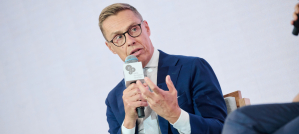YES and Victor Pinchuk Foundation to Host the 5th Ukrainian Lunch on the Margins of the Munich Security Conference
On February 19, 2022, on the margins of the Munich Security Conference, Yalta European Strategy (YES) and the Victor Pinchuk Foundation will host the 5th Munich Ukrainian Lunch, titled “Europe's Security is Decided in Ukraine. The aim of the Munich Ukrainian Lunch is to promote Ukraine on the global security agenda and underline Ukraine’s importance for Europe’s security and the international order.
The discussion will explore the threats to Ukraine’s security and what they mean for Europe and the West. What can be ways forward?
Zanny Minton Beddoes, Editor-in-Chief of The Economist, will moderate the discussion with Anne Applebaum, historian and staff writer at The Atlantic, Mircea Geoană, Deputy Secretary General, NATO, Ann Linde, Foreign Minister of Sweden, General James Mattis, former US Secretary of Defence and General David Petraeus, former Director of the Central Intelligence Agency of the United States.
Among the participants will also be: Mélanie Joly, Minister of Foreign Affairs, Canada; Peter Hultqvist, Minister for Defence of Sweden; Wolfgang Ischinger, Chairman, Munich Security Conference, member of YES Board; Jeppe Kofod, Minister for Foreign Affairs, Kingdom of Denmark; Ben Hodges, Pershing Chair, Center for European Policy Analysis, former Commanding General, U.S. Army Europe; Alina Mikhailova, SOS Army volunteer, Russian-Ukrainian war veteran; and Kurt Volker, Distinguished Fellow, CEPA.
On February 19 at 13:30 (GMT+1), watch the online streaming of the Ukrainian Lunch in Munich.
For the fifth time, the Munich Ukrainian Lunch will serve as a platform for global and Ukrainian decision makers to discuss Ukraine’s security and its implications for Europe and the international order. Previous speakers have included Chrystia Freeland, Robert Gates, Richard Haass, Kersti Kaljulaid, Miroslav Lajčák, Edi Rama, and President of Ukraine Volodymyr Zelenskyy.
Over the past five decades, the Munich Security Conference (MSC) has become the major global forum for the discussion of security policy. Each February, it brings together more than 500 senior decision-makers from around the world, including heads-of-state, ministers, leading personalities of international and non-governmental organizations, as well as high-ranking representatives of industry, media, academia, and civil society, to engage in an intensive debate on current and future security challenges.
←Back to news list

